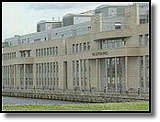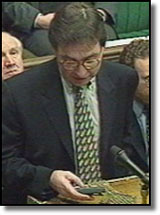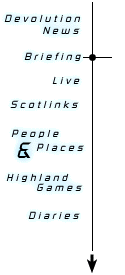
Scottish Devolution - the Dawn of an Electronic Democracy?
by Colin Smith

|
| Leith Docks: One of the possible sites for the Scottish Parliament. |
The White Paper on devolution provides the framework for the Scottish Parliament, but leaves it the responsibility to develop procedures which best meet its own purposes, presumably a task for the first intake of MSPs. With the White Paper, the Government has taken up the Convention's expectation that a Scottish Parliament would adopt modern methods of working, and be accessible, open and responsive to the needs of the public, encouraging participation in decision making by organisations and individuals. It now seems that there might be a specific role for information and communications technologies (ICTs) in making these aspirations as near reality as is possible.
Speculation on the likely role of IT in the devolved body is a fairly recent phenomenon. Last year, Jim Wallace MP, leader of the Scottish Liberal Democrats, used a speech at Heriot Watt University to call for a Scottish Parliament to be "the engine of an IT revolution and the blueprint for a new style of computerised democracy, by harnessing digital power and the Internet to put voters and MSP in permanent instant contact." Mr Wallace proposed that broadcasters, communications specialists and information technology experts be brought together to devise a scheme which would "maximise the opportunity for every Scottish resident to participate in the democratic process". The John Wheatley Centre Report 'A Parliament for the Millennium' published in June, also concentrated upon these issues, and the Government has now given its endorsement, with Scottish Office Minister for Devolution Henry McLeish saying that he hoped a Scottish Parliament would be a "a modern Parliament for a modern Scotland", and a "laboratory for democracy".

|
| The speakers chair at the Royal High School. |
Perhaps more revolutionary, MSPs could even be allowed to register their vote without being physically present in the chamber, perhaps in their constituency or on a trip, by monitoring the progress of debates on the Internet and then voting through a computer network, which could be either a dedicated network or a specially protected part of the Internet. Perhaps it's worth remembering that the only London equivalent to this is electric bells in the better restaurants of Westminster, which ring when divisions are about to occur in the House of Commons, allowing MPs a few minutes to get to the chamber and vote.
MSPs could also enjoy video-conferencing facilities allowing them to take part in meetings via an electronic network, without the need to be in one physical location. This might mean that the member for Orkney could hold regular surgeries for his constituents without having to undertake a time consuming journey when it wasn't strictly necessary. The one MP in the last Westminster Parliament who used this technology was Rod Richards, for holding remote surgeries from Westminster to his constituency, Clywd in Wales, although sceptics might point out that it didn't prevent him losing his seat on the 1st May.
The public could also gain in this jamboree of innovation, by being able to petition their MSPs from remote terminals placed in public buildings or libraries, where they could also access a huge amount of information on a whole range of matters to do with the Parliament, including full texts of debates. Some degree of participation in the actual decision-making process could also be introduced by equipping a representative sample of the population with a set-top box for their a television, allowing them to vote on government proposals during interactive TV debates. Snapshot opinion polls could also be taken on contentious issues, giving this sample a chance to be consulted before legislation is put into law.

|
| Westminster: 'quaintly resistant to IT' |
Nigel Jones MP, technology spokesman for the Liberal Democrats, vividly remembers his reaction when he arrived at his new office in 1992 "I was horrified, I used to have email to the world when I worked for the computer firm ICL; then I got elected, and there was a desk and a telephone which wasn't plugged in, and that was it. I was told to go down to the policeman at the member's entrance who had a key to the stationery corridor, and pick up my paper and envelopes and compliment slips and go off and help to run the country. I mean it's so out of date." 'Computing' magazine recently estimated that the number of IT-literate MPs rose at the last General election, from around 30 to almost 325, and most were astonished by the lack of IT in the House of Commons and the restrictions on its use in the chamber. Where they might reasonably have expected databases, electronic bulletin boards, internal networks and other computer aids, they were actually lucky to get a barely-equipped office. The more progressive amongst them might even look forward to a time when the facilities they are provided with will allow them to communicate electronically with their constituency party, party headquarters, or any member of the public with access to a networked PC, but that currently seems very far off: a network is being installed at Westminster, scheduled for completion some time after 2002. At the moment, the only way for them to access the Internet is through a modem into the telephone line.

|
| Brian Wilson checking his messages at the dispatch box |
The wide range of expectations surrounding devolution prompts us to consider the nature of the 'information age' which we are supposedly on the threshold of, and which, evangelists claim, has the power to transform the ways in which we engage in work, our social, and our political lives. The establishment of a 'wired' Scottish Parliament may be another step towards the emergence of a form of democracy which both its supporters and sceptics have anticipated since at least the 1960s. Once the preserve of science fiction, the notion of an 'electronic democracy' or tele-democracy', where a new generation of digital information and communications technologies are used to re-invent the processes of government, is now the subject of serious academic enquiry as new technologies begin to permeate through the machinery of Government.
Two visions are regularly promoted on the back of this, the most encouraging being the 'utopian' scenario, where ICTs might allow an unprecedented realisation of the democratic ideal, by providing a way for the widest possible participation in the government of the land. The second scenario is far less optimistic, and recalls the fears of George Orwell's 1984 by predicting a future where participation, and therefore power, is increasingly concentrated in a minority of the population who have access to the new computerised channels of communication, and the rich debate of democracy is reduced to push-button reaction to simplistic questions formulated by self-interested politicians.
These scenarios have often dominated debates about information-age government beyond their true worth, and obscured the realisation that technologies are only likely to complement established human social and political interaction, not replace it. In the sense that the recent UK general election was the most 'wired' ever, with parties vying with each other in their use of the Internet as a campaigning tool, while more privately using electronic communications networks in strategic support of their party organisations , 'electronic democracy' is already an established aspect of politics in the UK.
Perhaps one of the chief reasons for the promotion of the use of IT in the Parliament is a wish that it should be as responsive as possible to the opinion of all of the people of Scotland. The debate around the time of the 1979 devolution referendum, and an analysis of the turnout, suggests that rural areas were much less enthusiastic at the prospect than urban areas. This could have been because of suspicion that the Assembly would have embodied the views of the densely populated Scottish central belt, at the expense of the rest of the country. Proportional representation goes some way towards mitigating the likelihood that the Parliament will be dominated by one party grouping, but instituting mechanisms designed to ensure that it is accessible and responsive to a wide breadth of opinion, goes further towards satisfying those who feel their concerns would be ignored in favour of more stronger interests.
A more general concern is that of social exclusion. One scenario which is often associated with 'information age' agendas is a situation where those without access to the new technologies suffer exclusion from participation in new systems, and the benefits which may accrue from them, to the extent that an 'information rich' portion of society becomes distinct from those who are 'information poor'. In all probability it is those who own their own networked PC or have access to one at work who will benefit most from a 'wired' Parliament. An adequate provision of public information terminals giving a similar level of access to those who have a networked PC at their home or office is one way of ensuring that this kind of structural exclusion does not become too great a problem.
Finally, the nature of the democracy that might be fostered through the use of ICTs in a Scottish Parliament should also be of primary concern. Most - though not all - of the systems which have been aired recently have been responsive in nature; such as proposals to allow MSPs to vote remotely without participating in debates, and allowing the public to offer a 'yes' or a 'no' to political questions which have been formulated by others. This suggests a rather mean, narrow and less than reflective view of the democratic process. An optimistic view of democracy might be that it functions at it best when it embodies discussion, deliberation, and compromise, yet much of what is being suggested would actually short-cut these processes. Perhaps one way in which this could be remedied is by focusing upon the development of Parliamentary information systems which could allow a wider and more generous exchange of ideas. A range of ever-changing and responsive on-line discussion forums, where the public, MSPs and Members of the Scottish Executive could share their views, would be a rare and welcome example of ICTs being used to support a truly new form of politics - for a new Parliament.
Colin Smith is a Researcher in the Department of Management at Glasgow Caledonian University, and participates in the joint Programme for the Study of Telematics and Governance (P-STAG) between Glasgow Caledonian and Nottingham Trent Universities. email c.f.smith@gcal.ac.uk


